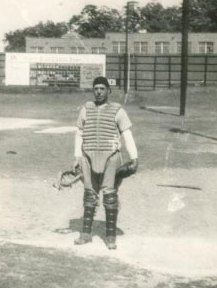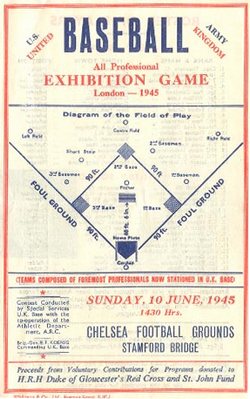This page is
proudly sponsored by the Sieber family
|
Eddie
Sieber
Date and Place of Birth:
February 20, 1915
Bainbridge
Township,
Coloma,
Michigan
Baseball Experience:
Semi-Pro
Position:
Catcher
Rank:
Sergeant
Military Unit:
Medical Corps, US Army
Area Served:
European Theater of Operations
 Edward A “Eddie” Sieber was born on February 20, 1915 in
Bainbridge Township,
Coloma,
Michigan. He was a pitcher and
catcher while at
Coloma
High School. His older
brother Ray would pitch one game with Eddie catching, then they
would trade places for the next game.
Edward A “Eddie” Sieber was born on February 20, 1915 in
Bainbridge Township,
Coloma,
Michigan. He was a pitcher and
catcher while at
Coloma
High School. His older
brother Ray would pitch one game with Eddie catching, then they
would trade places for the next game.
After graduation he
played for various
teams in Benton Harbor,
Michigan, including Phillips 66, Crystal Palace and the Watervliet Paper Company
team.
In the mid-1930s, Sieber traveled to
Bloomington, Indiana to try out for the St Louis
Cardinals. Hall of Fame
pitcher Burleigh Grimes ran the week-long tryouts. Sieber was among
13 catchers trying out that week and he was in the final two
catchers. At the end of
the tryouts he went home and a week later received a letter asking
him to report to the Cardinals minor league club at Decatur, Illinois.
Unfortunately, he was needed on the farm and the salary he
was offered to play ball was so poor he had to make the decision to
remain at home.
On May 10, 1943,
Sieber entered military service with the Army at Chicago, Illinois. He trained as a medic
and was stationed at
Camp
Grant and
Camp Ellis
in Illinois, and
Camp
Butner in North Carolina. It was at Camp Butner
that Sieber saw a poster advertising tryouts for the Camp Butner
baseball team. His
superiors weren’t going to let him try out, but another officer
stepped in and got him released to try out.
He made the team that traveled all over
North Carolina.
Sieber caught for Kirby Higbe of the Brooklyn Dodgers.
He also played against Ted Williams, witnessing him hitting
the longest home run he ever saw. The team traveled all over
North Carolina and played against the US Navy Pre-Flight
Cloudbusters, North
Carolina State, North Carolina Tar Heels and the Blue
Brigade.
In May 1944, Sieber was shipped overseas. He arrived in
Glasgow, Scotland a couple of weeks prior to D-Day, and
was assigned to the 137th
General
Hospital in
Wales, where he remained throughout the
remainder of the war in Europe.
 On Sunday, June 17,
1945, Sieber played for the “Whites” against the “Greys” in an
all-star game in London. Held at Stamford
Bridge Stadium – home of
Chelsea
soccer club – a crowd of 18,000 turned out to watch the hand-picked
military service teams.
On Sunday, June 17,
1945, Sieber played for the “Whites” against the “Greys” in an
all-star game in London. Held at Stamford
Bridge Stadium – home of
Chelsea
soccer club – a crowd of 18,000 turned out to watch the hand-picked
military service teams.
His brother Ray was stationed in
London
at this time as a special investigator for the Army Air Force.
The brothers were unaware that they were stationed so
close together and when Ray read in the
Stars and Stripes
that his brother was coming to play baseball in
London
he surprised him, sitting behind him in the stands.
Sieber was behind the
plate and his sixth inning run-scoring double gave the Whites a 5-3
lead. A late-inning rally by the Greys, however, saw them take the
game 7-5.
An all-star team from
the two squads was chosen to play games in mainland Europe but
Sieber
was headed for Japan, then rerouted back to the
States in July 1945. He was discharged early 1946.
Sieber continued playing baseball after the war in
Benton Harbor, Michigan.
When his sons began to play baseball, Sieber helped coach
them, and was instrumental in building four baseball fields in his
community to build interest in the game.
Sieber worked for Indiana and Michigan Electric Company and sold
real estate. He served on the St Joseph Township Board as a trustee
for over 30 years before retiring at age 92.
Eddie Sieber lives in Benton Harbor,
Michigan.
Thanks to Eddie Sieber and all members of his family for their
assistance in compiling this biography.
Created January 27, 2008. Updated January 28,
2008.
Copyright © 2007 Gary Bedingfield (Baseball
in Wartime). All Rights Reserved.


 Edward A “Eddie” Sieber was born on February 20, 1915 in
Edward A “Eddie” Sieber was born on February 20, 1915 in  On Sunday, June 17,
1945, Sieber played for the “Whites” against the “Greys” in an
all-star game in
On Sunday, June 17,
1945, Sieber played for the “Whites” against the “Greys” in an
all-star game in